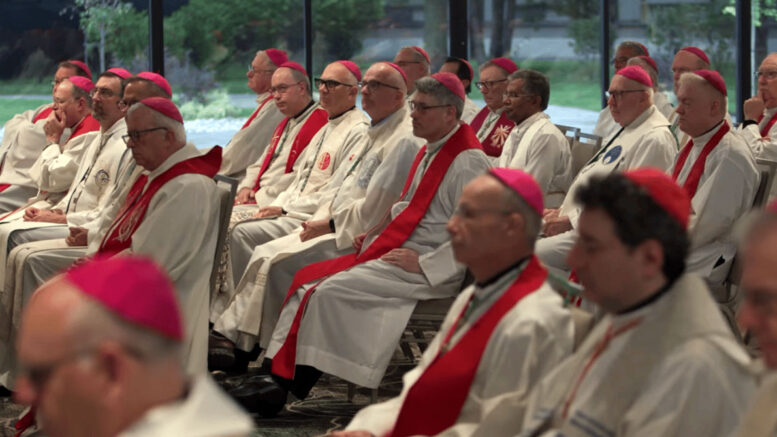By Quinton Amundson, The Catholic Register
[Toronto – Canadian Catholic News] – As the Canadian Conference of Catholic Bishops’ (CCCB) annual plenary came to a close in Montreal, newly elected president Bishop Pierre Goudreault shed light on how he and his fellow diocesan shepherds plan to engage with several significant cultural and political issues facing Canadians and the Catholic Church.
The 62-year-old bishop of the Sainte-Anne-de-la-Pocatière diocese since 2018 was asked on Sept. 26, at the conclusion of the plenary that began Sept. 22, about the Quebec government’s efforts to ban prayer in public spaces.
Goudreault stated that “bishops are not against laïcité (separation of Church and state), especially the bishops in Quebec,” but while the “state is secular, society is pluralist,” and therefore the different faith communities “have the right to speak, to contribute to the common good, to bring reflection.” He added that “the bishops want to collaborate with society in that way.”
Dialogue and cooperation are also desired with the federal government to safeguard pro-life and faith-driven non-profits in the long term.
In March, the CCCB issued a letter of concern to Minister of Finance François-Philippe Champagne about recommendations 429 and 430 within the Standing Committee of Finance’s Pre-Budget Consultations report released last December. These two proposals call for amendments to the Income Tax Act that would strip the charitable status of pro-life and “advancement of religion” not-for-profit organizations.
Goudreault suggested that groups must come together to respond effectively against these recommendations.
“We are sharing these challenges with our Christian partners,” said Goudreault. “It is important for us as Catholic bishops to reflect with other churches on this topic and to consider concrete actions. We’ve made statements already, and we want to continue to take this very seriously.”
The new CCCB president, vice president from 2023 to 2025 under Calgary Bishop William McGrattan, is also mindful of the ongoing push to expand euthanasia into Catholic health-care facilities. He acknowledged the fears of Catholics and shared how the bishops will continue advocating for life-affirming alternatives to medically-provided death (known as “MAiD”).
“Yes, Catholics are concerned, and so are the bishops,” said Goudreault. “That’s why we’ve made statements on this issue. In our dioceses we are working hard to provide information about palliative care, which we see as the true alternative. Palliative care can offer dignity and even beautiful moments at the last stage of life. That is the concrete action we are promoting.”
RELATED: New executive elected, range of issues addressed at CCCB Plenary – ARTICLE
Regarding action, Goudreault mentioned during his plenary remarks that “bishops have taken many steps — “protocols, formation, policies” — since publishing the 2018 report Protecting Minors from Sexual Abuse. The bishop stressed that “it is important to update them regularly. That’s why we are returning to this work now.” He wants the CCCB to go further this year in devising pastoral guidance documents to help protect minors and vulnerable persons.
The Canadian bishops also intend to lead by helping to shape the ethical framework of artificial intelligence, particularly its usage in Canada. On Sept. 23, they considered the insights of keynote speaker Fr. Philip Larrey, a Boston College philosophy professor who has written multiple books about AI.
No specific AI-centred initiatives were announced by the bishops in the immediate aftermath of the plenary, but Goudreault said the CCCB is sensibly considering how the technology “has both shadows and light.”
“There’s great potential, especially in health care, but also real concerns,” said Goudreault. “We want to emphasize that AI must never replace human intelligence and human relationships. Discernment is key in how we use AI.”
In advance of the annual National Day for Truth and Reconciliation on Sept. 30, Goudreault shared that $21 million of the targeted $30 million for the Indigenous Reconciliation Fund has been accrued. This money has helped fund 300 projects inspired by elders and residential school survivors.
-30-
30-
Canadian Catholic News (CCN) is a national news service, with members including Catholic newspapers, organizations, and individuals: CanadianCatholicNews.ca
Communications and Catholic Saskatoon News is supported by gifts to the Bishop’s Annual Appeal: dscf.ca/baa.
